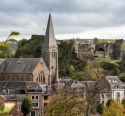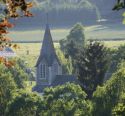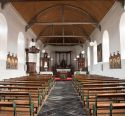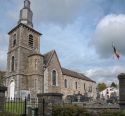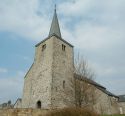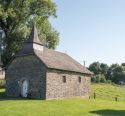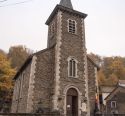Churches of the Ardennes, from century to century
Several churches are built on the very site of very old oratories, of which they have preserved traces. Some were destroyed and then rebuilt, especially after the Religious Wars. Others, more recent, testify to the styles in vogue at the time of our (great-)grandparents....
This tour is part of six tours designed by the Eglises Ouvertes network, "De clocher en clocher au coeur de l'Ardenne": 11 churches in La Roche-en-Ardenne, Rendeux, Manhay and Tenneville open their doors to you to share their history, their treasures and their unique atmosphere. Original and inspiring destinations for your family, walking, cycling or car trips. Discovery tools (adapted to children) await you there! Download our discovery brochure "From bell tower to bell tower in the heart of the Ardennes" (FR).
Continue on PC Download PDF Continue on mobile
-
Church Saint-Nicolas - La Roche-en-Ardenne
As a tourist pearl of the Ardennes at the end of the 19th century, La Roche-en-Ardenne had to have the most beautiful and largest church in the area. The one that stands today in the centre of the city, a remarkable neo-Gothic building, was inaugurated in 1901. It follows an older church, with a baroque bulbous bell tower that made its fame for a long time (...)
-
Church Saint-Lambert - Buisson
The village of Buisson is highly appreciated by walkers, cyclists and hunters. The church, recognizable from afar by its white plaster that shines in the sun, is welcoming and open all year round. It was built at the beginning of the 19th century, but several elements of its interior decoration date back to the previous century (...)
-
Church Saint-Martin - Hives
This old church (1586) was rebuilt in 1811 and enlarged in 1860. The bell tower and its staircase turret are characteristic of this period. Doesn't it look like the vault inside is an old boat hull (overturned)? Moreover, the central part of our churches is called "the nave", in reference to the boat that symbolizes the young Christian community in the Gospels. On the ground, the black marble slab pavement is 200 years old (...)
-
Church Saints-Pierre-et-Denis - Erneuville
Another very old church, the Erneuville church, as suggested by its external masonry made of fish bones (the opus spicatum of the Romans), probably dated from the 10th century. (...)
-
Eglise Saint-Rémy à Ortho
Ortho is a very old locality and has long been the primary church in the region. From the first construction, an outbuilding of the abbey of St-Hubert, there remains the bell tower (formerly used as a fortified refuge), which probably dates back to Romanesque times (...)
-
Chapel Saint-Hubert - Herlinval
First of all, it is the environment of this small chapel made of schist and rubble that will enchant you: a small green meadow surrounded by a low wall, a nearby stream, a bench to sit down and contemplate the landscape and the village houses (...)
-
Chapel Saint-Roch - Maboge
Distant from nearly 7 km from the church of Samrée, their official parish, the inhabitants of Maboge decided in 1865 to build their own chapel, without having to cross the woods (and face a 320-metre drop) to attend religious services (...)


